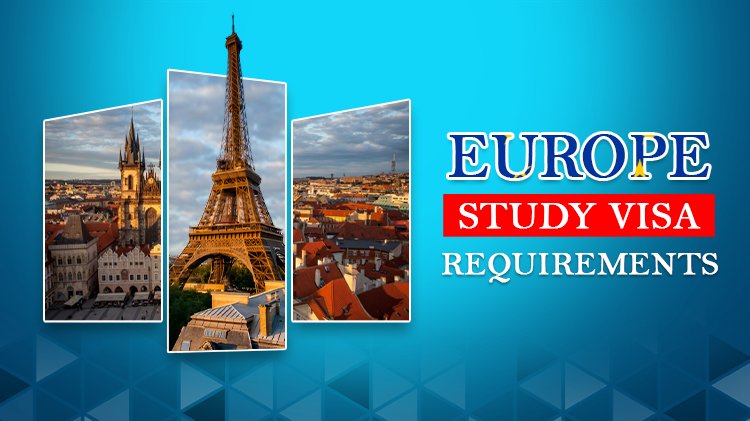Europe Study Visa Requirements
Explore the essential Europe study visa requirements on our website. Find detailed information to help you navigate the application process smoothly.

Have you ever wanted to study in Europe, a continent rich in cultural diversity? Starting a study abroad program in Europe is a great opportunity, but it needs careful planning, particularly in terms of securing the required visa. We'll lead you through the prerequisites for a study visa to Europe in this in-depth blog, giving you the confidence to pursue your academic goals there.
Introduction To Europe Study Visa
Some of the oldest and most prominent universities in the world are located in Europe, and they provide a wide range of academic programs in numerous subject areas. Studying in Europe promises to be a life-changing educational experience, whether you're drawn to the scenic campuses of Paris, the historic streets of Oxford, or the avant-garde institutions of Berlin. However, you must obtain the necessary study visa before you can fully immerse yourself in European academia.
Understanding Europe Study Visa Types
It's important to familiarize yourself with the many types of study visas available in Europe before diving into the detailed requirements:
1. Short-Term Study Visa: This type of visa is appropriate for up to 90-day academic exchanges, short courses, and language programs. It's perfect for anyone attending conferences, workshops, or summer schools.
2. Long-Term Study Visa: This type of visa, sometimes referred to as a resident permit or student visa, enables you to study in Europe for a prolonged length of time, usually the whole term of your degree program. Undergraduate, graduate, and doctorate programs all require it.
Key Requirements for Europe Study Visa
Let's now examine the particular conditions that you must meet in order to be granted a student visa for Europe:
1. Letter of Acceptance: You need to be admitted to an accredited European school before requesting a study visa. A valid letter of acceptance or enrollment confirmation from the school specifying your course of study, length of study, and any other pertinent information is required.
2. Proof of Sufficient Funds: Generally, countries in Europe need documentation proving you have enough money to live on during your visit. Examples of these could be bank statements, letters of recommendation for scholarships, or financial assurances attesting to your capacity to pay for living expenses, tuition, and other associated charges.
3. Health Insurance Coverage: A lot of European nations require visiting overseas students to have full coverage for their entire stay in health insurance. It is necessary for you to secure health insurance that satisfies the particular regulations of your new nation.
4. Language Proficiency: You might have to prove that you are proficient in the language in question, depending on the language your selected institution uses for education. This typically entails submitting documentation of your language proficiency from standardized assessments like the TOEFL, IELTS, or DALF/DELF for French.
5. Valid Passport: You must have a passport that is now valid and has an expiration date that is later than the time you plan to spend in Europe. Additionally, several nations mandate that your passport contain a predetermined amount of blank pages for visa stamps.
6. Clean Criminal Record: Background checks are usually performed in European nations to make sure applicants have no criminal history. When applying for a visa, you can be asked to submit a police clearance certificate or submit to a background check.
7. Proof of Accommodation: For your stay in Europe, you must present proof of appropriate lodging. A letter of accommodation from your school, a rental agreement, or a reservation for a dorm room could be examples of this.
8. Payment of Tuition: Depending on the nation and school, you might have to pay for tuition up front or show that you can afford it for the length of your study.
Application Process for Europe Study Visa
Depending on the country you intend to study in, the application procedure for a study visa to Europe may differ slightly. But generally speaking, the steps are as follows:
1. Requirements for Research Visas: Learn about the particular visa requirements of the nation you have selected, such as the kind of visa you want, the paperwork needed, and the dates for applications.
2. Complete the Visa Application Form: Provide all needed information and supporting documentation on the visa application form, making sure to fill it out completely and accurately.
3. Make an Appointment for Your Visa: Depending on the nation, you might need to make an appointment at the closest embassy or consulate in order to provide your biometric information and submit your visa application.
4. Attend the Visa Interview (if required): Part of the application process in some countries could entail attending a visa interview. Be ready to discuss your plans for your studies, your financial status, and your connections to your native nation.
5. Submit Biometric Information: As part of the visa application procedure, applicants must submit biometric information, such as fingerprints and a digital photo, in several European nations.
6. Await Visa Decision: After submitting your application, you will have to wait for a determination. Depending on the nation and the amount of applications, processing times can differ.
7. Get Visa Approval: If your application is approved, you'll get your study visa, which will let you go to Europe and start your course of study.
Getting a study visa for Europe is essential if you want to pursue your academic goals in this intellectually fascinating and culturally diverse continent. You can start your scholastic adventure in Europe with confidence and joy if you are aware of the prerequisites for obtaining a visa and take the time to complete the application procedure. Thus, get started organizing your study abroad experience right now and get ready to fully immerse yourself in Europe's dynamic academic scene!
What's Your Reaction?





















